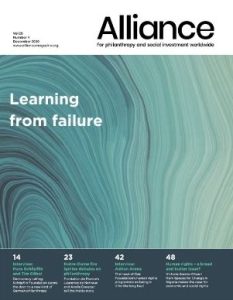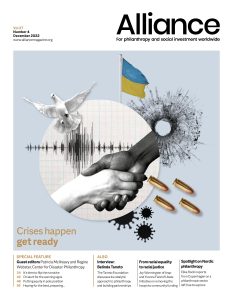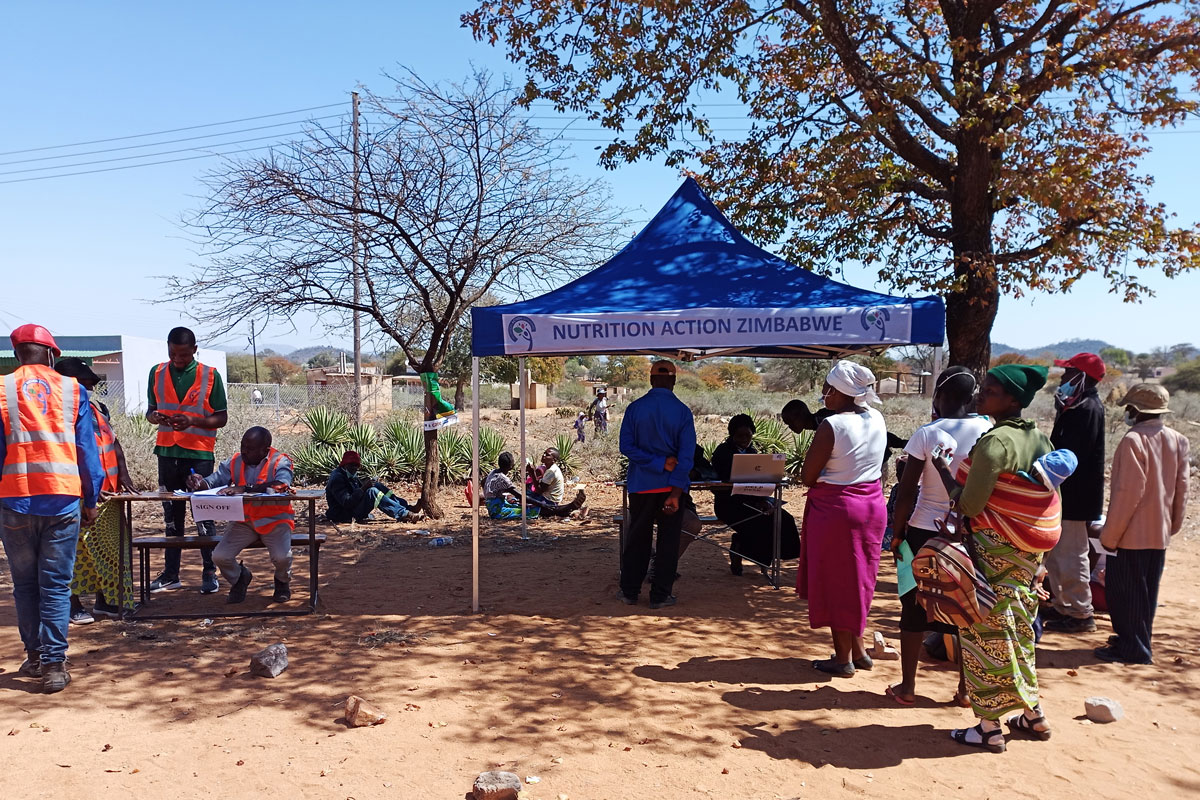Humanitarian funding needs fundamental reform.
The increasing number and intensity of disasters requiring humanitarian assistance, combined with the financial conditions facing national governments, will result in a greater demand for philanthropic intervention that the traditional model will struggle to service. The climate crisis alone is now forecast to produce ‘once in a century’ events on an annual basis. Philanthropic organisations must seek to go beyond the traditional outpouring of generosity when scenes of devastation hit our front pages and help to establish a system that protects communities at risk of disaster.
A recent evaluation at Start Network has indicated that up to 55 per cent of all humanitarian funding goes to crises that are somewhat predictable, and yet only one per cent of that funding is organised in advance. If we acknowledge that there is only a limited future in a system that focuses solely on people who are already in crisis, then how can we, with a clear conscience, continue to justify that this is where the vast majority of our limited collective resources are channelled?
Acting in advance of crises to empower communities to protect their own lives and livelihoods, provides a more dignified and morally justifiable alternative. The concept is beginning to garner more and more support across the sector; however, actual implementations of the policy remain few and far between. Traditional aid donors are still reticent to use taxpayers’ money to new and innovative ideas; particularly when these ideas are for future events and not related to whichever current disaster dominates our front pages.
If the humanitarian sector is going to effectively move towards a more anticipatory model, there needs to be a fundamental mindset shift in both when we release funding, and who that funding goes to. Furthermore, the argument needs to be made that funding local organisations and communities prior to the onset of disaster is not only ethically imperative but that it is financially efficient and effectively manages risk.
The challenge currently lies in finding evidence of this efficiency with such limited funding for anticipatory action programmes as a whole. We have broad statements suggesting that as little as $1 in prevention can save $6 in aid, but we don’t have a detailed analysis of programmes from which not only evidence but learnings can be garnered and shared. Without knowing what works best, is shifting large amounts of public money towards anticipatory action worth the risk?
This is where philanthropy can take the lead. Free from some of the scrutiny that faces the custodians of public funds, there lies an opportunity for the community to drive the agenda forward and invest in the cutting-edge.
This question of appetite for risk is central to changing the mindset of the way in which philanthropists approach funding communities. As stated earlier, if we know that we cannot meet the demands of those in need, isn’t it too risky (as well as ethically questionable) not to try something different?

Read Alliance magazine’s issue on learning from failure
A recent piece by Donika Dimovska in Alliance discusses how the philanthropic sector needs to take ‘smart risks’ that lead to ‘intelligent failure’; essentially acknowledging that there will be things that don’t work, but ensuring that these ‘failures’ result in learning that is both useful and actionable. This is reliant on creating systemic culture which allows philanthropists to collaborate and share risk, but not fear failure itself.
In 2021, at COP26, Start Ready was established with the objective of releasing pre-positioned, pooled funding to local organisations prior to the onset of the crisis. The decision to release these funds is taken when a relevant parametric risk model (e.g. drought in Senegal) reaches a pre-set level and is therefore ‘activated’.
As we finish our first year, over £4 million has been released to communities at risk, for example for heatwaves, on simple interventions such as cooling kits and water stations. Communities made their own decisions on how to best prepare themselves and, as a programme, numerous lessons have been learnt from both successes and failures. In Pakistan alone, a country that sadly typifies the increasing complexity the humanitarian world faces, there have been instances where activations have enabled people to mitigate the worst impacts of floods, heatwaves and droughts, but there have also been times when the risk models have not activated, and the window for anticipatory action has been missed.
This is not the place for a detailed evaluation of Start Ready, and there are other initiatives that are using innovative funding mechanisms to try and maximise the impact of every dollar available. What these programmes do have in common, however, is that they operate in a culture of ‘intelligent failure’. This culture is created by a number of factors; the combination of data-driven, scientific and/or actuarial approaches to decision-making; the pooling of resources and risks; and the agency of local actors.
Additionally, those engaged in anticipatory action also share a common goal; transforming the system of humanitarian aid. This objective stems from the moral standpoint that acting early maintains individual dignity for those in need and preserves a community’s agency to take decisions that will alleviate the impending impact.
However, this objective also comes from the belief that moving to protecting those at risk rather than helping those in need is essential in enabling the humanitarian sector to function efficiently.
It will always be difficult to measure exactly what the impact of crisis mitigation is, financially, to any given hazard. Much like it is imperfect science to work out the return on investment of preventative medicine. The objective is not to create the perfect balance sheet, it is, like the argument for preventative care, to shift the mindset to acknowledging the ethical and logical imperative, whilst obtaining enough evidence that it is financially efficient.
Given the arguably fewer restrictions facing philanthropists when compared to governments, there is an opportunity for the community to fund programmes that will allow the evidence base to grow. The programmes that will lead the way in shifting the mindset and create a future framework of a system that no longer spends 99 per cent of its resources on helping those who find themselves in a predictably desperate situation.
Matthew Stickland is Head of Communications at Start Network.
New issue: Crises happen: get ready
 The December 2022 issue of Alliance magazine explores the role of philanthropy in crises and suggests that acting before the fact – rather than simply reacting – is the way ahead. The issue is guest-edited by Patty McIlreavy and Regine Webster of the Center for Disaster Philanthropy.
The December 2022 issue of Alliance magazine explores the role of philanthropy in crises and suggests that acting before the fact – rather than simply reacting – is the way ahead. The issue is guest-edited by Patty McIlreavy and Regine Webster of the Center for Disaster Philanthropy.
Subscribe today to make sure you don’t miss it!









Comments (0)